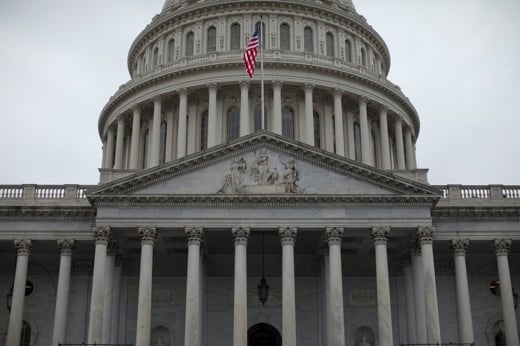Moody's estimates loss of AAA rating would add $100B to Uncle Sam's carrying costs; impact on Treasuries 'significant'
Political wrangling over a plan to reduce the deficit may cost the U.S. its AAA rating, adding $100 billion a year to government costs while dragging down economic growth, according to Wall Street bond dealers.
A U.S. credit-rating cut would likely raise the nation's borrowing costs by increasing Treasury yields by 60 to 70 basis points over the “medium term,” JPMorgan Chase & Co.'s Terry Belton said today on a conference call hosted by the Securities Industry and Financial Markets Association. Standard & Poor's, which has given the U.S. a top ranking since 1941, reiterated on July 21 that the chance of a downgrade is 50 percent in the next three months and may cut the nation as soon as August.
“That impact on Treasury rates is significant,” Belton, global head of fixed-income strategy at JPMorgan, said during the call held by the securities industry trade group. “That $100 billion a year is money being used for higher interest rates and that's money being taken away from other goods and services.”
Treasury Secretary Timothy Geithner has said the U.S. will exhaust measures to avoid breaching its $14.3 trillion debt threshold on Aug. 2. The government reached its borrowing limit on May 16. President Barack Obama has threatened a presidential veto of House Speaker John Boehner's two-step plan slated to be voted on tomorrow to raise the U.S. debt ceiling and cut $3 trillion in government spending.
Yields Decline
Moody's Investors Service on July 13 put the U.S. on review for downgrade, while Fitch Ratings reiterated July 18 that it would cut its rating on Treasury securities if the government's misses a debt payment. The “short-term” effect on Treasuries of a downgrade would be about 5 to 10 basis points because few asset managers would be forced to sell Treasuries, Belton said.
Yields on benchmark 10-year notes fell five basis points, or 0.05 percentage point, to 2.95 percent today, according to Bloomberg Bond Trader prices. That compares with an average of 4.03 percent since 2001.
Senate Majority Leader Harry Reid said today in Washington he was told by credit-rating companies his deficit-cutting proposal would not prompt a downgrade of U.S. debt. Boehner yesterday offered a two-step plan would raise the U.S. borrowing limit by up to $1 trillion and later by $1.6 trillion while requiring larger spending cuts, according to Republican aides.
Reid Proposal
“Standard & Poor's has chosen not to comment on the many and varying proposals that have arisen in the current debate,” John Piecuch, a New York-based spokesman for S&P, said in an e- mail. “Any statement to the contrary is inaccurate,” he said.
Reid's proposal would cut $2.7 trillion in spending and give Obama the full $2.4 trillion in additional borrowing authority he seeks, enough to get through the 2012 elections. Reid dropped Democrats' insistence on tax increases.
The Nevada Democrat said today Boehner's plan “gives the credit agencies no choice but to downgrade U.S. debt” and that the Senate will vote on his proposal soon.
“If we're in a situation in which the U.S. has effectively lost some of its long-term credibility, particularly with overseas partners who are big buyers of Treasuries, then that does make it that much harder to get a long-term sustainable budget situation in place,” Michael Hanson, senior economist at Bank of America Merrill Lynch in New York, said during the conference call.
The U.S. unemployment rate rose for a third straight month in June to 9.2 percent, pointing to an economy lacking momentum entering the second half of the year. Employers added 18,000 workers to payrolls, the fewest in nine months and less than the most pessimistic forecast in a Bloomberg News survey of economists.
The concern stemming from a credit-rating downgrade “is a negative for growth, and that's an environment in which investment and hiring is lower than it otherwise would be,” Hanson said.
--Bloomberg News--







